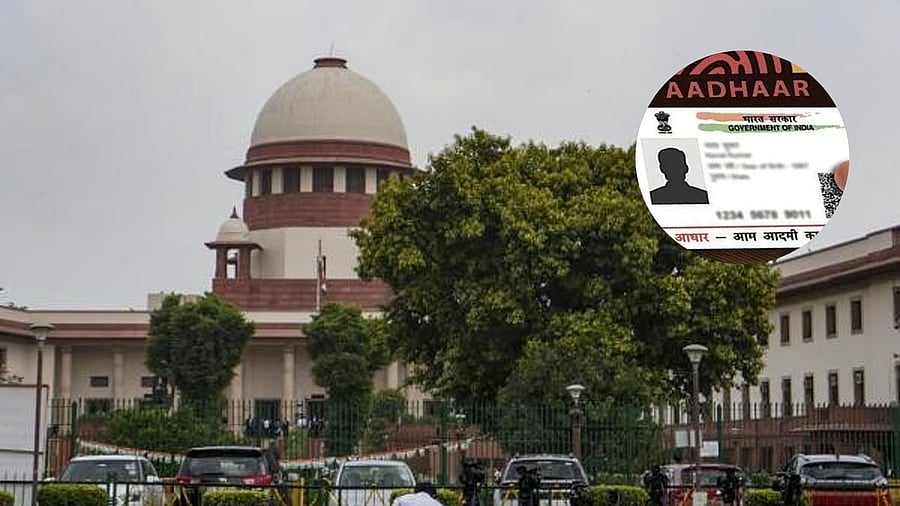
The Supreme Court of India, Representative image of an Aadhaar card (inset).
Credit: PTI Photos
New Delhi: The Supreme Court on Thursday favoured the creation of an autonomous body to make digital content creators and platforms accountable for the accuracy and legality of online publications.
It also suggested for Aadhaar verification of age to access content deemed as obscene.
A bench of Chief Justice of India Surya Kant and Justice Joymalya Bagchi emphasised on balancing freedom of expression with fairness and protecting society, innocent people, and children against harm.
"Once scurrilous material is uploaded on a digital platform, even having some anti-national content, it may soon go viral with millions of viewership," the bench said.
The court said there has to be some impartial, autonomous body and an authority which should be free from platform users and also from the state's control.
The bench said self-styled bodies will not help, and some neutral autonomous bodies, free from the influence of those who exploit all of this and the state also, are needed as a regulatory measure.
The court was hearing the petitions filed by podcaster Ranveer Allahbadia and others challenging the FIRs related to the obscene content in the 'India's Got Latent' show. The court had expanded the scope of the matter to consider guidelines against online obscenity.
Attorney General R Venkataramani and Solicitor General Tushar Mehta said that the Centre has proposed some new guidelines and is in the process of consultation with the stakeholders.
A counsel flagged the lacunae in the user-generated content (UGC) like on YouTube and Facebook, and the Ministry of Information and Broadcasting has filed a note saying that it is thinking about regulating the digital content on UGC.
The bench said the question which is troubling us is where the content is perceived, let us say anti-national.
“Where content is perceived as disruptive of societal normalcy, will there be a self-regulating responsibility of the intermediaries to curate those materials and not permit circulation," the bench asked.
"The difficulty we are facing is the response time. Because once a scurrilous material is uploaded by the time the platform reacts, it is viral. It has millions of viewership. How do you plug that gap," the bench asked.
The court also asked if a publication showed a part of sovereign India is not a part of India, will that be permitted.
Advocate Prashant Bhushan, appearing for a party, however, asked, "Somebody writing an academic piece about the history of dispute regarding a territory, whether Sikkim was rightly annexed or not, will that be regarded as anti-national?"
"There is an autonomous body created. Let that person go and prove that my content right…there can be a mechanism," the court responded.
Bhushan said, "The problem is that power to decide, suppose they are obscene, against decency etc".
The court, however, said "The fundamental right to speech that has to be respected and protected, and there is no question of tinkering with that, but at the same time, the society and innocent people, children, they too have right, and their right is also fundamental right. We are only on balancing both fundamental rights".
Bhushan said the word anti-national is vague and the same issue was discussed threadbare in the Shreya Singhal case with reference to laws in the United State and the United Kingdom.
"But if you do not have such a thing (autonomous body) and you allow everything to be aired or telecast, then subsequently what will you do? Do we expect these innocent people to file defamation cases," the bench asked.
Bhushan mentioned his stand against the COVID-19 vaccine, and he was labelled somebody who was spreading vaccine skepticism.
"Writing against some government regulation is not a difficulty. Not a serious issue. Dissent is always a part of a healthy democracy. Nobody disputes all these things, and the problem arises when you put something on YouTube or any other channel, and there are millions who are victimised. They do not have a voice, and they do not have a platform. By the time they rush to the court, damage is done," the bench said.
The court was informed that regulations are already in place in the form of the Information Technology (Intermediary Guidelines and Digital Media Ethics Code) Rules, 2021, which are under challenge in a batch of petitions which have been transferred to the Delhi High Court.
The bench was informed that despite the stay of some of the provisions of the rules, the OTT platforms were voluntarily following the Digital Media Ethics Code, by labelling the nature of content and giving age classifications.
Mehta said that the issue was not just confined to "obscenity" but "perversity".
The court fixed the matter for further consideration after four weeks.
